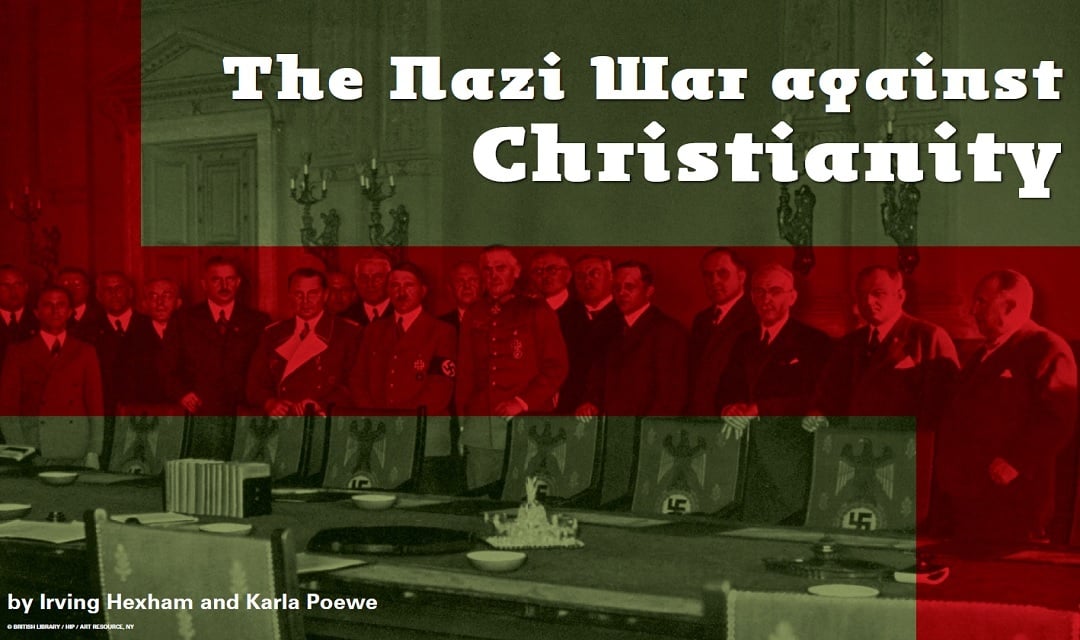This article first appeared in the Christian Research Journal, volume 37, number 05 (2014). The full text of this article in PDF format can be obtained by clicking here. For more information about the Christian Research Journal, click here.
SYNOPSIS
Today, rationalist propaganda loudly proclaims that the Nazis were Christians and that Christianity, especially Protestant Christianity, was responsible for the Holocaust and untold crimes against humanity. Such claims are based on poor history and a failure to understand the complexity of National Socialism, which at its core was a new religious movement. Refuting this misleading conception of history is important for both Christians and non-Christians alike who hope to understand the depth of Nazi evil.
Today a growing number of articles, books,1 websites, and blogs2 promote the view that Nazi leaders were Christians alienated from the church. Consequently, Christians are increasingly blamed for Nazism and the Holocaust. To refute these slanders, understanding Nazism is important.
AUREL KOLNAI AND THE WAR AGAINST THE WEST
Aurel Kolnai (1900–1973) was a Hungarian Jew who grew up in Vienna and converted to Christianity in 1926 after reading G. K. Chesterton. His 1938 book The War against the West is the earliest complete description of National Socialism and the neopaganism that inspired its followers.3 He recognized that Nazism was far more than a historical aberration caused by the defeat of Austria and Germany in World War I. He identified much deeper roots grounded in a deep resentment against Christianity and God’s revelation in the Bible. Once World War II began, Kolnai’s work was quietly forgotten because it clashed with the portrayal of Nazis in British and American propaganda as unthinking thugs. His systematic treatment of the anti-Christian sentiment of Nazis shows that Nazism was not the work of uneducated thugs, but was developed by intellectuals who turned their backs on the entire Western intellectual tradition because of its association with Christianity.
Here it is important to note that Kolnai was not alone in representing Nazism as a movement rooted in ideas. From 1933 onward, a small group of British and German scholars, including people such as Chesterton, published a series of booklets called the Friends of Europe publications to warn the world about Nazi evil. These outlined different aspects of Nazism and its attack on Western Christian values. Later, a number of authors of Jewish descent, including Peter F. Drucker (1909–2005),4 Karl Popper (1902–1994),5 and George L. Mosse (1918–1999),6 who experienced Nazism firsthand, provided a similar analysis. Yet today their evidence is increasingly ignored.
After World War II, a new interpretation of Nazism grew up centered on Hitler and brute force. As a result, the role of intellectuals was quietly forgotten because the world was told the Nazis lacked an ideology. Technically, this claim is correct, but it overlooks the fact that in condemning the uselessness of ideologies, the Nazis embraced the idea of “Weltanschauung,” or worldview. This, they argued, was far more powerful than an ideology because it united ideas with action.
Initially, following World War II, everyone, including the aggressively anti-Christian philosopher Bertrand Russell (1872–1970),7 agreed that the Nazis were anti-Christian. Slowly, however, largely as a result of the publication of William L. Shirer’s Berlin Diary (1941) and The Rise and Fall of the Third Reich (1960),8 the popular understanding of Nazis began to change. While Shirer carefully pointed out Christian resistance to Nazism, he also highlighted what he saw as the role of Martin Luther in encouraging anti-Semitism. Since then, this view has become widely accepted, leading many to see a link between the Reformation and the Nazis, leading to the Holocaust.
MARTIN LUTHER AND THE JEWS
At first sight, Martin Luther’s (1483–1546) polemical work On the Jews and Their Lies (1543) clinches the matter in favor of Shirer. But, as Martin Brecht points out in his major biography of Luther, things are not that simple.9 This is also noted by Martin H. Bertram in the introduction to this troublesome book in the Concordia edition of Luther’s Works.10
As both Brecht and Bertram show, the problem is one of contextualization. Early in his career, Luther wrote That Christ Was Born a Jew (1523), which strongly protests against the demonization of Jews, urging compassion and understanding. Therefore, the question arises whether Luther changed his mind or simply developed ideas latent in his early works.
The answer seems to be a combination of both. There is no doubt that after reading the work of a former rabbi and Christian convert Anthony Margaritha’s book on Judaism, Luther’s views hardened. But to what extent the role of anti-Christian polemics by some Jewish writers who attacked both the Roman Catholic Church and Luther played a role is unclear.11 Equally important is the content of Luther’s argument when stripped of his inflammatory rhetoric. Before looking at this, it needs to be noted that Luther used all sorts of insults to attack the Jews that were no different to his attacks on Roman Catholics and others with whom he disagreed. Today, such arguments are shocking. At the time, most writers did not hesitate to use the coarsest language to attack opponents. Bad language was the politically correct speech of the day.
The bulk of Luther’s attack concentrates on biblical exegesis and what he sees as the Jewish failure to interpret Scripture correctly. Only in section three of his treatise does Luther become really objectionable by repeating numerous medieval legends about Jewish perversity. This section is really bad and includes the idea that Jews should convert to Christianity or be driven out of German-speaking lands. To put this in context, it is important to note that Luther’s proposals were rejected immediately by other reformers, such as his friends Philip Melanchthon (1497–1560) and Andreas Osiander (1498–1552).12
THE NAZIS AND LUTHER
At first sight, Martin Luther’s work seems an ideal fit with Nazi ideology, as Shirer says. Yet things are not so simple. Showing anti-Judaic attitudes in Luther’s work is one thing. Arguing that these writings led to National Socialism is another.
John Warwick Montgomery13 makes the valuable point that Shirer’s criticisms of Luther were first articulated by Peter F. Wiener in Martin Luther: Hitler’s Spiritual Ancestor (1945).14 He then shows that flaws of this work were documented by the respected Luther scholar Gordon Rupp in Martin Luther: Hitler’s Cause or Cure? (1945).15
Uwe Siemon-Netto, in his excellent The Fabricated Luther: Refuting Nazi Connections and Other Myths (2007),16 adds to Montgomery’s arguments. He contributes to the debate in two ways. First, he cites evidence that Luther’s book On the Jews and Their Lies had a very limited circulation and was largely ignored at the time of its publication. It was reprinted in the “late-sixteenth and early seventeenth centuries, but had limited impact on the general population.”17 Later, the Nazis republished the book and selectively used it without fully embracing Luther or his writings.
To understand Luther’s impact on National Socialism, it is important to take a close look at the National Socialist views of Luther. These are found in many works and given a semi-authoritative status in the writings of the chief Nazi ideologue Alfred Rosenberg (1893–1946). Rosenberg claimed that Luther was an important historical figure who smashed the idea of priesthood and “Germanized Christianity.”18 Nevertheless, he said Luther delivered Germans to the fantasies of “Jewish zealots like Matthew, materialistic rabbis like Paul, African jurists like Tertullian, and insecure half-castes like Augustine.”19 Thus, the Protestantism he created “was spiritually divided,” symbolized by the fact that at the Diet of Worms he “laid his hand simultaneously on both the Old and New Testaments.”20
For Rosenberg, this symbolic act meant that the center of German “spiritual life lay outside Germany.” As a result, Germans came under the thrall of Judaism because Luther “smuggled the spirit of the Old Testament into Protestantism” and “substituted for Rome a Semitic Jerusalem as its centre.”21 Thus, when translating the Psalms into German, Luther made them sound “beautiful,” when in reality, he says, they are “terrifyingly vengeful.”22 As a result, according to Rosenberg, the Germans were entrapped by Jewish ways of thinking.
NAZI NEOPAGANISM
Some authors, such as Richard Steigmann-Gall, attempt to argue that Rosenberg and fellow neopagans in the Nazi party were unimportant. In presenting this argument, Steigman-Gall tells his readers that Rosenberg’s key work, the Mythus, “was easily the most abstruse book ever written by a Nazi” and was “largely ignored” because Nazi leaders, including Hitler and Goebbels, rejected it. Therefore, although a bestseller, the sales figures are “not a real reflection of its popularity” because the book remained unread.23
The problem with this claim is that Nazi leaders were always criticizing other Nazi leaders. Therefore, it is easy to find statements by almost all of them that criticize Rosenberg while on other occasions they praise him to high heaven.24 Importantly, writers such as Steigmann-Gall, who associate the Nazis with Christianity, totally ignore the fact that Rosenberg produced a New Age type of writing that has its own appeal.25 More importantly, they ignore George Hutchinson’s outstanding, but unpublished, Oxford University PhD thesis The Nazi Ideology of Alfred Rosenberg: A Study of His Thought.26 In this work, Hutchinson provides extensive documentary evidence to show that Rosenberg’s work was both widely distributed and carefully studied by a large number of people.
Apart from academic questions about the importance of Rosenberg, to dismiss Nazi neopagans is to overlook the enormous influence of Heinrich Himmler and the “Schutzstaffel,” or SS. The best introduction to his vision of a new Germanic religion is found in Peter Longerich’s excellent biography Heinrich Himmler.27 Longerich shows the interrelation between Himmler’s personal beliefs and the way he promoted them through the SS. Should anyone doubt that these beliefs made a difference to the way members of the SS behaved, Christian Ingrao’s meticulous study of SS intellectuals shows beyond doubt that the beliefs Himmler propagated were deadly. Hence the title of Ingrao’s book Believe and Destroy: Intellectuals in the SS War Machine.28
THE ROOTS OF NAZI RAGE
Scholars and popular writers who blame Christianity for the Nazi movement overlook the fact that Christianity is meaningless without the Old Testament.29 This fact was recognized in the early church, which totally rejected the teachings of Marcion of Sinope (second century) and some Gnostics that separated the God of Jesus from the God of Israel by rejecting the Old Testament. Christianity without the Old Testament and its Jewish heritage makes no sense.
The roots of the Nazi rejection of the Jews must be sought elsewhere. Although there are a variety of sources for Nazi beliefs, one that comes up repeatedly in the writings of National Socialists is biblical criticism. To many, this will sound strange, if not absurd. After all, surely the leading biblical critics of the nineteenth century were devoted scholars whose sole interest was the study of the Bible and problems they encountered in the biblical text. This is a nice way of seeing things that overlooks the personal lives of many biblical critics. Thus, John Rogerson30 and William Baird31 make virtually no mention of the social and political beliefs of biblical scholars even though many of them, particularly in Germany, were deeply involved in nationalist and other political movements.
For example, Paul Rose shows that the career of Bruno Bauer (1809–1882), a leading biblical critic, “vividly demonstrates the intimate connection between revolutionism and racism” because Bauer “developed the concept of a
coherent ‘political antisemitism’” that was implemented through a sophisticated propaganda campaign.32 Then he explains that this “crusade began in earnest in 1841 with a Critique of the Synoptic Gospels” that applied ideas Bauer first developed in his Religion of the Old Testament (1838).33
Significantly, Bauer published a tract, Herr Hengstenberg (1839), in which he attacked the well-known conservative scholar and church leader Ernst Hengstenberg for “seeing Christianity as a continuation of Judaism.” Since then, the work of Hengstenberg (1802–1867), who was professor of theology at the University of Berlin and leader of the conservative party in the Prussian church, has been dismissed as “confessional” in various histories of biblical scholarship.34 Yet Hengstenberg was one of the few nineteenth-century biblical scholars to recognize what was at stake in terms of the rejection of the Jews.
THE FUNDAMENTALIST SMOKESCREEN
Bauer’s attack on Hengstenberg is significant in another way because it sets the tone of future arguments about the nature of biblical criticism. Today, and for most of the past century, anyone who questions the methods and theories of biblical scholars is immediately dubbed a “fundamentalist” and dismissed. Thus ad hominem arguments serve as a smoke screen to replace serious questioning.35 Actually, the road to the annihilation of European Jews was long and winding. Although there are many places one can begin to trace its source, the rise of biblical criticism is certainly one of them. This was recognized in 1903 by Rabbi Solomon Schechter (1847–1915), who spoke about “the Higher anti-Semitism,” which he said grew out of nineteenth-century biblical criticism.36
Schechter, who was writing thirty years before the Holocaust, had no illusions. He recognized that something fundamental had changed in European attitudes toward Jews and viewed the change with foreboding. He wrote, “The Jews of the civilized world have been lulled into a fancied security which events have not justified…anti-Semitism of the vulgar sort has become odious…But the arch-enemy has entered upon a new phase…this is the more dangerous phase because it is of a spiritual kind…what I might call the Higher anti-Semitism.”37
This he clearly identified as a “professional and imperial” movement based on “intellectual persecution.”38 He ends his prophetic article with the observation that “we are standing now before a crisis.”39 This he recognized as a desire to destroy Jews by “denying all our claims for the past” and leaving them “without hope for the future.”40 To be sure, Schechter did not speak about the physical destruction of Jews because he rightly saw that their spiritual destruction was far more deadly. This is an intellectual destruction that “burns the soul though it leaves the body unhurt,”41 which laid the foundation for the SS.
Anyone who doubts this link or thinks it is only a “German thing” needs to consider theologians such as the biblical scholar and Anglican Bishop Arthur Headlam (1862–1947), who led the way in promoting anti-Semitic and pro-Nazi attitudes in Britain during the 1930s.42 Although most Anglican clergymen were not attracted to Fascism, the evidence seems to be that the more theologically “progressive” ones were the most susceptible to it.
The reason for this becomes clear when one reads Susannah Heschel’s excellent work The Aryan Jesus: Christian Theologians and the Bible in Nazi Germany. She exposes the role of biblical scholars in creating anti-Jewish propaganda. Most chilling are her final chapters where she shows that after the end of World War II, the very people who promoted Nazi ideas in theology quickly reinvented themselves as resisters whose Christianity distanced them from Nazism.43
Oxford scholar Robert Morgan has questioned Heschel’s arguments and makes a good case that in some instances her evidence is weak.44 But his argument does not refute her overall thesis. All it does is show that further research is needed in this area. Fortunately, a number of other works support Heschel’s ideas. Prominent among these are Alan Davies’s older study Infected Christianity: A Study in Modern Racism and Shawn Kelley’s Racializing Jesus: Race, Ideology, and the Formation of Modern Biblical Scholarship.45
INTELLECTUAL DOGMAS
All of this brings us back to Kolnai’s astute observations about Nazi neopaganism. The charge that the Nazi leadership was antichurch yet essentially Christian does not stand up to examination. Nevertheless, it is increasingly popular. Therefore, Christians and anyone interested in truth need to understand the dynamics of the Nazi worldview, which was systematically anti-Jewish and saw Christianity as a form of Jewish “intellectual imperialism.”46
Once this is recognized, then the way Nazi leaders such as Himmler sought alternatives to Christianity by experimenting with Buddhism, Hinduism, and Islam needs to be recognized. But, as the British writer Rudyard Kipling liked to say, “That is another story.” The other issue that this article raises is the need for a radical rethinking of the methods and theories of biblical scholarship. This is urgently needed to free it from its largely unrecognized anti-Semitic roots.
Finally, it is important for Christians to widen their vision by recognizing that intellectuals, even long-dead ones, can have a continuing influence and that the roots of many contemporary criticisms of Christianity are to be found in the work of scholars who helped create National Socialism. This will not be an easy task, but it is one to which Christians are called if they want to see the church survive in an increasingly hostile culture.
Irving Hexham teaches in the Department of Religious Studies at University of Calgary.
Karla Poewe is professor emerita from the Department of Anthropology at University of Calgary.
NOTES
- Richard Steigmann-Gall, The Holy Reich: Nazi Conceptions of Christianity, 1919–1945 (Cambridge: Cambridge University Press, 2003).
- http://www.nobeliefs.com/Hitler1.htm.
- Aurel Kolnai, The War against the West (London: Victor Gollancz, 1938).
- Peter F. Drucker, The End of Economic Man (New York: John Day, 1939).
- Karl R. Popper, The Open Society and Its Enemies (London: G. Routledge, 1945); Karl R. Popper and Mark Amadeus Notturno, The Myth of the Framework: In Defence of Science and Rationality (London; New York: Routledge, 1994).
- George L. Mosse, The Crisis of German Ideology: Intellectual Origins of the Third Reich (New York: Grosset and Dunlap, 1964); Nazi Culture (New York: Grosset and Dunlap, 1966).
- Bertrand Russell, The Scourge of the Swastika: A Short History of Nazi War Crimes (London: Cassell, 1955).
- William L. Shirer, Berlin Diary (London: H. Hamilton, 1941); The Rise and Fall of the Third Reich: A History of Nazi Germany (New York: Simon and Schuster, 1960).
- Martin Brecht, Martin Luther (Minneapolis: Fortress Press, 1993), 333–51.
- Martin Luther, Jaroslav Pelikan, and Helmut T. Lehmann, Luther’s Works on CD-ROM 47 (Philadelphia: Fortress Press, 2002).
- Martin H. Bertram, Introduction to On the Jews and their Lies. Martin Luther, Jaroslav Pelikan, and Helmut T. Lehmann, Luther’s Works on CD-ROM 47 (Philadelphia: Fortress Press, 2002).
- Ibid.
- John Warwick Montgomery, In Defence of Martin Luther (Milwaukee: Northwestern Publishing House, 1970), 143–49.
- Peter F. Wiener, Martin Luther: Hitler’s Spiritual Ancestor (London: Hutchinson, 1945).
- E. Gordon Rupp, Martin Luther: Hitler’s Cause or Cure? (London: Lutterworth Press, 1945).
- Uwe Siemon-Netto, The Fabricated Luther (St. Louis: Concordia Publishing House, 2007).
- Ibid., 51.
- Alfred Rosenberg, Der Mythusdes 20. Jahrhunderts (München: Hoheneichen Verlag, 1935), 12.
- Ibid., 13.
- Ibid., 129.
- Ibid., 128–29.
- Ibid., 364.
- Steigmann-Gall, 92–94.
- Irving Hexham, “Inventing ‘Paganists’” and Ernst Piper,“Steigmann-Gall, The Holy Reich,” in The Journal of Contemporary History (2007): 47–78.
- Irving Hexham, “The Mythic Foundations of National Socialism,” Koers 76, 1 (2011): 155–70. Available online at: http://www.koersjournal.org.za/index.php/koers.
- George Hutchinson, The Nazi Ideology of Alfred Rosenberg: A Study of His Thought (Oxford: Oxford University, unpublished PhD thesis, 1977).
- Peter Longerich, Heinrich Himmler (Oxford: Oxford University Press, 2012).
- Christian Ingrao, Believe and Destroy: Intellectuals in the SS War Machine (Cambridge: Polity Press, 2013).
- See Joseph Ratzinger, Jesus Von Nazareth (Freiburgim Breisgau: Herder, 2001). This was published in English by Benedict XVI and Adrian J. Walker as Jesus of Nazareth: From the Baptism in the Jordan to the Transfiguration (San Francisco: Ignatius Press, 2008). In the German original, Ratzinger clearly states that he is writing under his own name and not as Pope Benedict, to encourage people to interact and disagree with his arguments. Unfortunately, this comment was left out of the English translation of this excellent book.
- J. W. Rogerson, Old Testament Criticism in the Nineteenth Century (Philadelphia: Fortress Press, 1985).
- William Baird, History of New Testament Research (Minneapolis: Fortress Press, 1992).
- Paul Lawrence Rose, German Question/ Jewish Question: Revolutionary Antisemitism from Kant to Wagner (Princeton, NJ: Princeton University Press, 1992), 263.
- Ibid., 264.
- Rogerson, 79, 90.
- See Irving Hexham, “Trashing Evangelical Christians: The Legacy of James Barr’s Fundamentalism,” in Tough Minded Christianity: Festschrift for John Warwick Montgomery, ed. William Dembski and Thomas Schirrmacher (Nashville: B and H Academic, 2009), 69–91.
- Solomon Schechter, Seminary Addresses and Other Papers (Cincinnati: Ark Publishing, 1915), 36. Available online at: http://people.ucalgary.ca/~uwr/books_online/judaism.html.
- Ibid., 35–36.
- Ibid., 38.
- Ibid., 39.
- Ibid., 37.
- Ibid., 36.
- Richard Griffiths, Fellow Travellers of the Right (London: Constable, 1980), 72, 121, 175–77.
- Susannah Heschel, The Aryan Jesus: Christian Theologians and the Bible in Nazi Germany (Princeton, NJ: Princeton University Press, 2008), 242–89.
- Robert Morgan, “Susannah Heschel’s Aryan Grundmann,” Journal for the Study of the New Testament 32, 4 (2010): 431–94.
- Alan T. Davies, Infected Christianity: A Study of Modern Racism (Kingston, ON: McGill-Queen’s University Press, 1988); Shawn Kelley, Racializing Jesus: Race, Ideology, and the Formation of Modern Biblical Scholarship (London: Routledge, 2002).
- Karla O. Poewe, New Religions and the Nazis (Oxford: Routledge, 2006), 172–73; cf. Gene Edward Veith, Modern Fascism: Liquidating the Judeo-Christian Worldview (St. Louis: Concordia, 1993).









